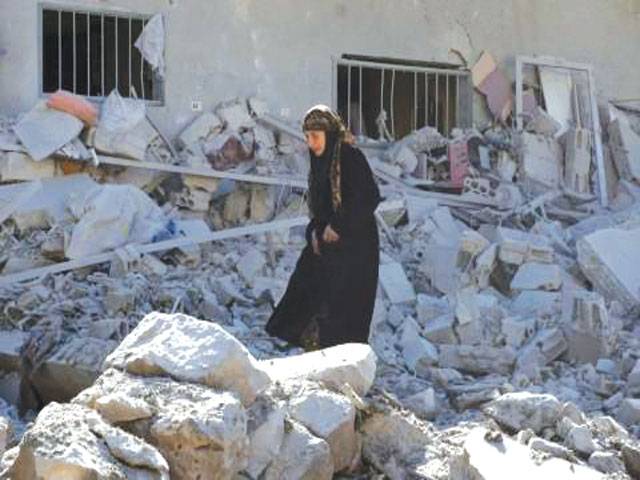Alex Bellamy - The Responsibility to Protect is a disarmingly simple principle. Agreed to in 2005 by every world government, it holds that states should protect their populations from atrocious crimes and that when they manifestly fail to do so, the world - through the UN and regional organizations - should take timely and decisive action to protect people in their stead.
Though it might not look like it, the world is better at responding to atrocities today than it was in the past. Compared with the 15 years before 2005, the international community is more likely to respond to humanitarian crises and much more likely to focus on protecting civilians.
But like all political principles, the responsibility to protect - R2P for short - is not a self-executing silver bullet. Political leaders must commit the will and resources needed to deliver on their commitments. And when it comes to today’s crisis in Syria, the international community has clearly failed to fulfil its duty.
The reasons for our failure in Syria are well known. Russia and the West have been unable to find common ground and have radically different interpretations of the problem - and its resolution. Regional players have established and backed their own proxies in the fight. The Syrian opposition has been badly fragmented, and the conflict has given rise to violent extremism. No party has negotiated in genuine good faith, and all think they can fight their way to a better outcome. And all the while, Syria’s civilians have been trapped in the crossfire, subjected to atrocious crimes - chemical weapons attacks, indiscriminate bombing, mass executions, mass rape and the selling of women and girls into sexual slavery - on a bewildering scale. By besieging whole communities and denying them humanitarian aid, the Syrian regime has also returned to the barbaric art of using starvation and malnourishment as a weapon of war.
Despite the commitment that states have made, principles like the responsibility to protect still rub up against harsh realities. But that does not mean that R2P itself is a failure - only that we have failed to fulfil it.
The principle provides a standard against which to judge the international response in times of crisis, and the UN General Assembly has openly deplored the Security Council’s failure to fulfil its responsibilities, showing that the response to Syria is well out of step with community expectations. If the council fails to take heed, it will soon find itself in a crisis of legitimacy as states look for ways around it. Perhaps aware of these pressures, the council member states have found some common ground on protecting Syrians: disabling chemical weapons stockpiles in the wake of the Ghouta massacre, permitting humanitarian access with the government’s consent and addressing the threat to civilians posed by the Islamic State.
Still, responsibility to protect enjoins us to do more. We need innovative thinking and comprehensive approaches to protection.
One of the most obvious ways in which governments can fulfil their responsibility to protect innocent Syrian citizens is by providing asylum to those fleeing Bashar al-Assad’s “barrel bombs” and the Islamic State’s beheadings. Rather than the piecemeal, disjointed and perpetually shifting policy it has adopted this far, the international community should empower the UN’s high commissioner for refugees to register the displaced, ascertain their credentials as genuine refugees and find resettlement places in third countries.
Governments should also dramatically step up the provision of humanitarian relief to front-line states - the UN’s humanitarian request was little more than half-met in 2015 and is faring little better in 2016 - and inside Syria, and to think about better ways to deliver it to those most in need. Should cease-fire proposals fail to deliver - as well they might - ideas such as militarily defensible secure zones and humanitarian aid corridors might have to be dusted off and seriously considered.
At the institutional level, governments should provide international support for the UN-brokered peace negotiations and search for tangible ways to reward those committed to peace and to punish those who block it. Both in this crisis and elsewhere, more resources should be made available to investigate atrocity crimes, to ensure that those responsible are one day held to account. These and other measures are practical steps that can make a real difference to whether people live or die.
The Responsibility to Protect was born out of a shared belief that we must do better to protect people from mass atrocities, and a conviction that we could do better. Syria shows that we have a long way to go to make it a lived reality.
Yet retreating into cynicism and blame won’t help those living under threat. What is needed is frank acknowledgement of failure, a shared determination to do better and imaginative thinking about how to overcome the roadblocks. We owe that to the survivors of Syria’s horror.–Washington Post
Saturday, April 20, 2024
Syria is a failure of commitment, not principle

Freedom Flotilla prepares for humanitarian aid delivery to Gaza
9:14 AM | April 20, 2024
22 suspects arrested
April 20, 2024
Policitising Tragedy
April 20, 2024
Tehran to Rafah
April 20, 2024
A New Leaf
April 20, 2024
A Tense Neighbourhood
April 19, 2024
Dubai Underwater
April 19, 2024
Dangers of Deepfakes
April 20, 2024
Feudalism
April 20, 2024
Kite tragedy
April 19, 2024
Discipline dilemma
April 19, 2024
Urgent plea
April 19, 2024
ePaper - Nawaiwaqt
Advertisement
Nawaiwaqt Group | Copyright © 2024





